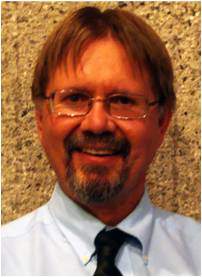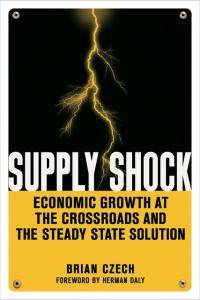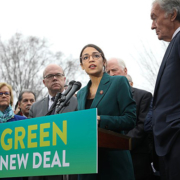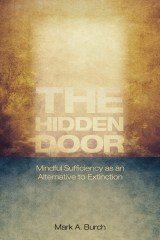Supply Shock: The Journey
by Brian Czech
 Writing a book is like going on a journey. You explore the terrain, make discoveries, meet interesting people, and maybe learn new languages. The longer the book-writing, the longer the journey.
Writing a book is like going on a journey. You explore the terrain, make discoveries, meet interesting people, and maybe learn new languages. The longer the book-writing, the longer the journey.
Supply Shock was a long journey; here is a short travelogue.
I set out in the fall of 2000 to explore the world of environmental and economic sustainability: fresh, feeling strong, and relatively young (at least for this type of journey). Not only was I out to explore the world, but change it! I’d seen enough already to know my mission: revolutionize the way the world dealt with economic growth.
Two earlier journeys — Shoveling Fuel for a Runaway Train and The Endangered Species Act — had taught me quite thoroughly about the fundamental conflict between economic growth and environmental protection. That was plenty of learning for instilling the mission. But there was literally and figuratively a world to explore, to learn the ways of pursuing the mission.
Not that I got to see much of the world literally. As Herman Daly put it in the foreword to Supply Shock, this was a book financed by the “Czech Foundation” — my nights, weekends, and leave from the “day job” with the U.S. government. No gondolas in Venice on this journey. However, I did spend at least a little time on focused study and conferencing in places as far flung as Poland and Ukraine, India and Thailand, Brazil and Colombia, with odd stops at places like the London Zoo (to speak about biodiversity loss) and La Décroissance conferences in Paris and Barcelona.
More importantly, however, I toured the worlds of the “worldly philosophers,” as Robert Heilbroner called the classical economists. The vessel of choice was the classic text, complemented by the invaluable exegeses of the economic historians. I toured their worlds as well as those of the Marxists, Georgists, and just about every other economic scholar united with an “ist.”
 But the journey was far from restricted to the hallways of economic history. In fact, I spent much more time in the raw elements of physical and biological science, collecting the theoretical rare metals needed to patch up the holes in the conventional worldview of economic growth. The rarest of all was the one required to demonstrate, once and for all, that there is no reconciling the fundamental conflict between economic growth and environmental protection. (You’ll find it in Chapter 8.)
But the journey was far from restricted to the hallways of economic history. In fact, I spent much more time in the raw elements of physical and biological science, collecting the theoretical rare metals needed to patch up the holes in the conventional worldview of economic growth. The rarest of all was the one required to demonstrate, once and for all, that there is no reconciling the fundamental conflict between economic growth and environmental protection. (You’ll find it in Chapter 8.)
Sailing back and forth between the two continents of science and economics, I encountered diverse islands populated by anthropologists, theologians, the Council of Economic Advisers, national income accountants, World Bank demonstrators, politicians of all stripes, political appointees of all philosophies, and the UN General Assembly. They were all part of the journey; all part of Supply Shock.
For the most part it was a lonely journey, rowing upstream one day and riding into the wind the next. Hardly anyone out there in the political world wants you coming to their town on words of “limits to growth” or “steady state economics.” Virtually all politicians, most political appointees, and a lot of publishers allow only the happy horses of win-win rhetoric. There are precious few campsites for the truth about why we can’t have our cake and eat it too. For one cold and weary rider, New Society Publishers was green grass, fresh water, and dry firewood.
Now if you are an unlucky rider — I mean author — the keyboard eventually becomes an unwelcome sight. This is not a happy development. This is like the steering wheel looking bad to the race car driver, or the fly rod looking ugly to the fisherman. Ruthlessly enough, however, thumbs, wrists, and elbows tell you it’s time to hole up for the proverbial winter. It’s either that or learn voice recognition softwear – “correct that… software.”
If you’re just lucky enough, however, your book is done before then. So, directly from the intellectually herky-jerky throes of voice-recognition learning land, I offer my opinion that it is time for you to go out and grab your own copy of Supply Shock. In the reading another journey begins — your journey.
Bon voyage!







Brian’s earlier book, Shoveling Fuel for a Runaway Train, opened my eyes to the unsustainability of economic growth and our culture’s obsession with it. It was a great read and I still recommend it. So I’m looking forward to reading Supply Shock.
Dave Gardner
Director of the documentary’
GrowthBusters: Hooked on Growth
Brian, who would you say is the audience for your appeal? If it is not the top 0.1-1% who own claims on virtually 100% of labor, production, profits, and gov’t receipts via compounding interest claims in perpetuity, how do you expect to influence the current imperial corporate-state hierarchical system of power relations?
If it is not to appeal to the top 0.1-1%, then how should the next 9% and/or the bottom 90% respond in order to influence the top 0.1-1% or those in the professional middle-class next 9% to exert pressure or influence on the top 0.1-1%?
I have personally been a student of ecological/biophysical economics and sustainability, and a practitioner of permaculture for 20-25 years, and while I have witnessed an increasing awareness of ecological/exergetic limits and discussion of alternatives to unsustainable growth of population and consumption on a finite planet, I regrettably see virtually no public affirmation of same by Wall St. principals, CEOs, alpha politicians, state and local elected officials, academic economists, nor mass-media influentials.
It seems that we are preaching to a choir of increasingly the disinterested, discouraged (marginalized) few.
Dave, in referring to my question above to Brian, which I assume he won’t read nor respond to, what progress are you witnessing from your excellent work?
Less as desirable so as to sustain less to avoid having much less in the future is a REALLY tough sell, especially in a hyper-growth-addicted western society, the gospel of which has now spread to China-Asia.
BC: in the advent that Brian doesn’t respond, I’ll take a stab: his book would be about empowering the 0-99%, to free them from the addiction you mention, which afflicts all to many people in that slice of the population, too. This disempowers everyone; when the choice is given between growth (which to all has become synonymous with merely having enough) and environment, most will choose having enough, therefore growth.
By rejecting the premise of the “enough requires growth” paradigm and providing his audience with an alternative option, Brian’s book can bring hope for a better future. I recently read a dialogue between pro-growth and pro-enough advocates; it was clear that the pro-growth advocate saw ANY variation away from growth as an argument for austerity. This was & is not the case, of course, just as licensing of gun ownership is not the same as banning ownership of firearms.
Bottom line for me is that we need to reduce the degree of representationalism in our society; democracy has come a long way, but we don’t really need it to be a representative one any more. We can vote from the comfort of our own homes, any day of the week, once everyone has internet access. Hub-and-spoke models of all kinds (energy production, manufacturing, voting, law-making) are relics of an era when travel was essential for work. This is no longer the case. We can be our own representatives and our own producers.
BC, Brian laid out a plan for the masses in Shoveling Fuel for a Runaway Train. I don’t know if his thoughts about that have changed, but I wouldn’t be surprised if this new book addresses your question. Brian clearly thinks about this sort of thing.
As for your question about any progress I’m seeing: I am seeing more and more people getting off that runaway train, stepping off the treadmill that serves the growth machine, and reinventing their lives. I believe that is a necessary PART of the solution. But it is happening very slowly. We need to see it accelerate.
Can we ever hope to convince those with obscene profits from growth to jettison the Holy Grail? I doubt it, though there will be a few rare gems. Not exactly an ex-profiteer, but Tom Shadyac was a multimillionaire who writes and speaks (and made a film – I Am) about how “the good life” wasn’t so good. He has just published a great book: http://lifesoperatingmanual.com
Dave Gardner
Director of the documentary
GrowthBusters: Hooked on Growth
The merchant class has every interest in keeping the growth myth alive in the minds of the masses that it essentially farms for profits. They have been at this ever since the end of the last dark ages (read Henri Pirenne’s ‘Economic and Social History of Medieval Europe’; it’s an interesting story of the seemingly insatiable quest of more gain by those engaged in commerce). The introduction of fossil fuels 150 or so years ago acted as an amplifier of consumption which has led to the quagmire of the present. Fortunately the Age of Oil is rapidly coming to a close so this global industrial civilization that has grown to an unmanageable size and complexity will soon begin it’s unwinding to something much less so. Will it be another Dark Ages? Who knows. Will it be painful? Most likely, at least for the masses. The best they can do is try to become more self-sustaining; they less one is tied to ‘the system’ the better their chances will be once that system begins to wind down.